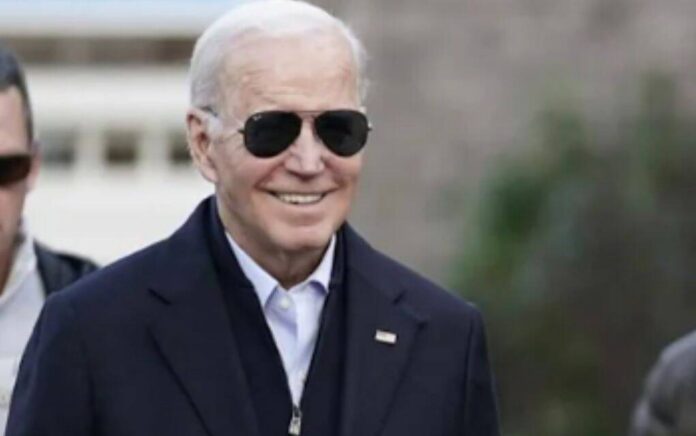
Kamala and Joe are cooking up something terrifying. But their plans may unravel before they’ve reached their full potential.
Because a White House backdoor censorship scheme was exposed in this bombshell report.
In a glaring example of how deeply entrenched censorship has become in the Biden administration, Rob Flaherty, a Biden/Harris surrogate, took it upon himself to personally reach out to social media giants in a blatant effort to scrub criticism of then-Democratic nominee Joe Biden from the internet ahead of the 2020 election.
This wasn’t just a one-off power grab; the administration later brought Flaherty into the fold as White House Director of Digital Strategy, where he continues to communicate with Big Tech, pushing them to suppress the voices of private citizens online.
On Wednesday, independent journalist Matt Orfalea exposed this collusion by posting footage of a Zoom call on X. The call, which took place in mid-November 2020—just days after the mainstream media had declared Biden the president-elect—reveals the extent to which the Biden/Harris campaign was willing to go to silence opposition.
During the call, Flaherty, who served as the Biden/Harris campaign’s Digital Director, bragged, “One of the smartest things I think that the [Democratic] Party did itself was that over the last couple of years, they actually invested in a team … to detect and track misinformation.”
But what he and his Democratic colleagues labeled “misinformation” was often nothing more than legitimate criticism of their candidate.
Flaherty made it clear that this team, led by Democratic activist Tim Durigan, was in charge of identifying these so-called “misinformation narratives” online and flagging them to platforms as violations.
“The stuff that they did was a critical asset,” Flaherty claimed, revealing just how essential censorship was to their campaign strategy. “That piece of infrastructure I think was one of the more important decisions that was made in the … sort of the party space over the last couple of years.”
Orfalea pointed out that alleged emails “show Flaherty carrying out the (supposedly) counter-misinformation program in the White House, pushing Facebook to censor” conservative voices that dared to challenge the Biden-Harris administration’s COVID shot mandates. Despite leading this Orwellian operation, when asked under oath to define “misinformation,” Flaherty conveniently refused, as noted by Orfalea.
Flaherty continued to boast about the campaign’s efforts, referencing Biden/Harris Rapid Response Director Becca Rinkevich: “We brought Becca on to sort of think through, ‘Okay, now that we have these misinformation narratives, what do we actually do?”
Flaherty’s comments underscore how the campaign wasn’t just passively concerned about criticisms regarding Biden’s corruption, mental fitness, or his controversial record on the 1994 crime bill—they were actively scheming on how to suppress these valid concerns.
Rinkevich admitted during the Zoom call that the campaign “saw a huge amount of volume and a lot of impact on narratives like ‘Joe Biden was being manipulated by the radical left,’ and disinformation around his mental acuity.”
Orfalea rightly noted that the Biden/Harris team went so far as to microtarget voters exposed to what they called “disinformation” (or, as some might argue, reality) about Biden’s deteriorating mental state.
The tactics didn’t stop there. Rinkevich explained that they were targeting people based on their online behavior to combat narratives questioning Biden’s mental fitness.
“We targeted folks based on online behavioral cues, building out personas based on the type of content they were consuming, what they were searching, sites they were visiting – so that we could target folks in real-time as they were exposed to that disinformation,” she said.
Orfalea also highlighted journalist Sasha Issenberg’s book “The Lie Detectives: In Search of a Playbook for Winning Elections in the Disinformation Age,” where Issenberg discusses Flaherty and Rinkevich’s role in this campaign. Issenberg bluntly described how they would “grab a voter at a moment of curiosity and then, essentially, keep badgering her as she traveled across the internet.”
On Chris Hayes’ podcast, Issenberg further detailed the strategy of marking age and health concerns about Biden as “disinformation.” The so-called “Sleepy Joe storyline” was a significant issue because it had the potential to influence voters’ decisions, Issenberg admitted.
In the end, the Biden/Harris campaign’s efforts to counter the “Sleepy Joe” narrative included buying search terms like “Biden” and “senile” to track and manipulate voters’ perceptions by bombarding them with carefully curated content.
As if that wasn’t enough, Orfalea pointed out that Biden’s team even deployed an army of online influencers to fight what they termed “disinformation.”
Flaherty’s unapologetic defense of these tactics during the Zoom call is telling. He admitted that questions about Biden’s mental fitness, which polling showed were effective attacks, could be easily deflected by simply flooding the internet with content of Biden speaking—proof, according to Flaherty, that “ameliorated” any doubts.
“So, we encouraged those people to share content that did that thing,” he concluded.
It’s clear that the Biden/Harris campaign wasn’t just playing defense—they were engaging in a full-scale war on free speech, using Big Tech as their weapon of choice.
Stay tuned to The Federalist Wire.



















